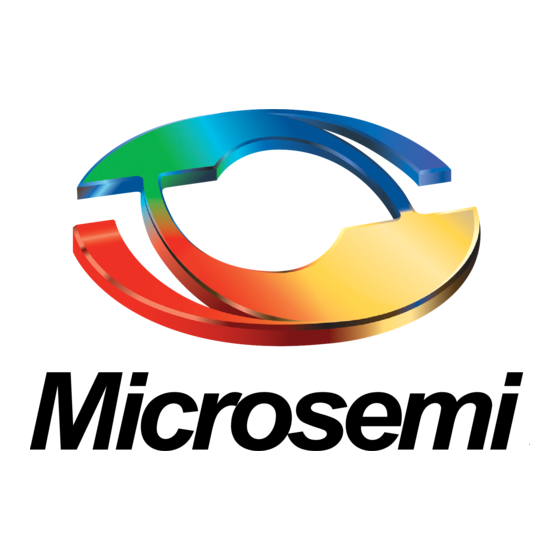
Table of Contents
Advertisement
Quick Links
Advertisement
Table of Contents

Summary of Contents for Microsemi VSC8211
- Page 1 VSC8211 User Guide VSC8211 Evaluation Board December 2013...
-
Page 2: Table Of Contents
CAT5 to SGMII with Clause 37 AutoNeg Enabled ..................8 4.4.2 CAT5 to RGMII ............................8 4.5 Useful Registers ..........................9 4.5.1 Ethernet Packet Generator ........................9 4.5.2 Far-End Loopback ............................ 9 4.5.3 Near-End Loopback ..........................9 5 Additional Information ........................ 10 VPPD-03472 VSC8211 User Guide Revision 1.0... -
Page 3: Revision History
The revision history describes the changes that were implemented in this document. The changes are listed by revision, starting with the most current publication. Revision 1.0 Revision 1.0 was published in December 2013. This was the first publication of the document. VPPD-03472 VSC8211 User Guide Revision 1.0... -
Page 4: Introduction
Introduction The VSC8211 device is a low-power, gigabit Ethernet transceiver suited for media converters and Ethernet switches with virtually any serial or parallel MAC interface. The VSC8211 device also includes Vitesse’s VeriPHY cable diagnostics feature. This document describes the operation of the VSC8211 Evaluation Board (VSC8211EV). The... -
Page 5: General Description
VSC8211 Evaluation Board General Description The VSC8211EV provides users a way to evaluate the VSC8211 device in multiple configurations. One RJ- 45 connector is provided for the copper media interface. The MAC interface is accessible via SMA connectors. An SFP cage is available for serial configurations, and headers are available for the parallel interface. -
Page 6: External Refclk Option
3.1.10 EEPROM Option The user may choose to configure the VSC8211 via an EEPROM load. In order to program the EEPROM properly, pull-up or pull-down resistors must be configured for either R6 – R8 or R24 – R26. Please refer to Section 19 of the datasheet regarding to EEPROM programming requirement. -
Page 7: Software Requirements
VSC8211 Evaluation Board Software Requirements The VSC8211 GUI can be loaded on to any PC or laptop that complies with the following requirements: The PC must run a recent version of MS-Windows. According to the Microsoft website, the following operating systems can run .NET based applications:... -
Page 8: Quick Start
Once installed, connect the USB cable between the USB port of the PC and the USB connector (J20) on the evaluation board. Ensure the MDIO and MDC jumpers are properly placed from DUT to F340 on J23 to establish the connection between the VSC8211’s SMI pins and the SiLab F340. -
Page 9: Using The Gui
The EVB serial number should appear. If not, click on “Scan For USB Devices.” Select that EVB serial number then click “Launch GUI”. The Register List window will appear as shown in the figure below. VPPD-03472 VSC8211 User Guide Revision 1.0... -
Page 10: Test Cases
CAT5 to SGMII with Clause 37 AutoNeg Enabled After power-up or reset, VSC8211 as configured on the evaluation board will operate according to CAT5 to SGMII with Clause 37 Auto Negotiation enabled. The 1G Ethernet received at the RJ-45 port is routed through the VSC8211 and looped back via SGMII through SMA cables. -
Page 11: Useful Registers
4.5.3 Near-End Loopback When MII Register 0 bit 14 is set to 1, the transmit data (TDP/TDN) on the MAC side is looped back onto the receive data (RDP/RDN pins) to the MAC. VPPD-03472 VSC8211 User Guide Revision 1.0... -
Page 12: Additional Information
VSC8211 Evaluation Board Additional Information For any additional information or questions regarding the devices mentioned in this document, contact your local sales representative. VPPD-03472 VSC8211 User Guide Revision 1.0... - Page 13 Microsemi. It is the Buyer's responsibility to independently determine suitability of any products and to test and verify the same. The information provided by Microsemi hereunder is provided "as is, where is" and with all faults, and the entire risk associated with such information is entirely with the Buyer.








Need help?
Do you have a question about the VSC8211 and is the answer not in the manual?
Questions and answers